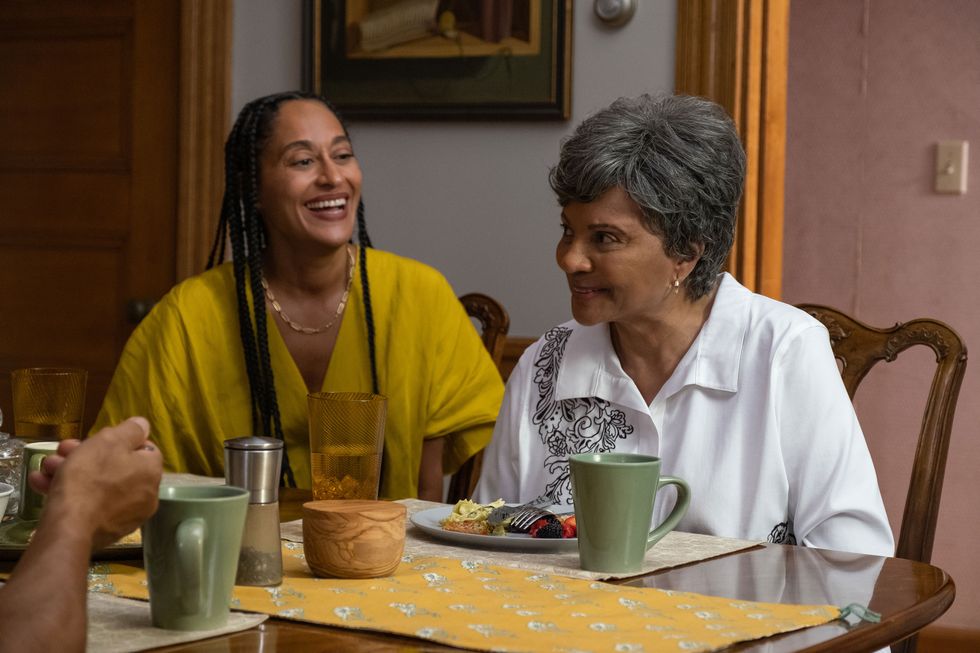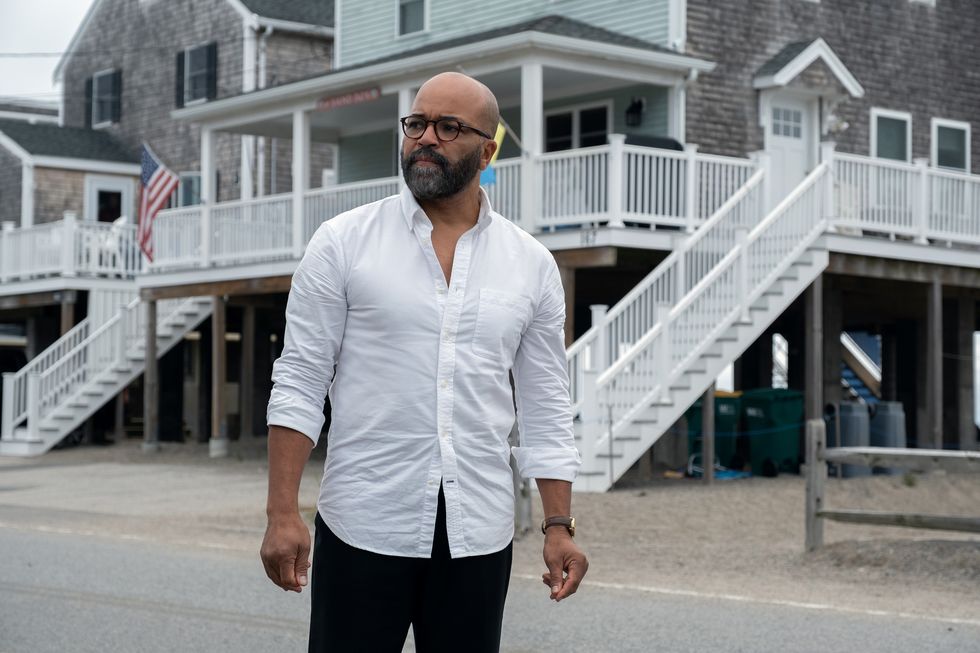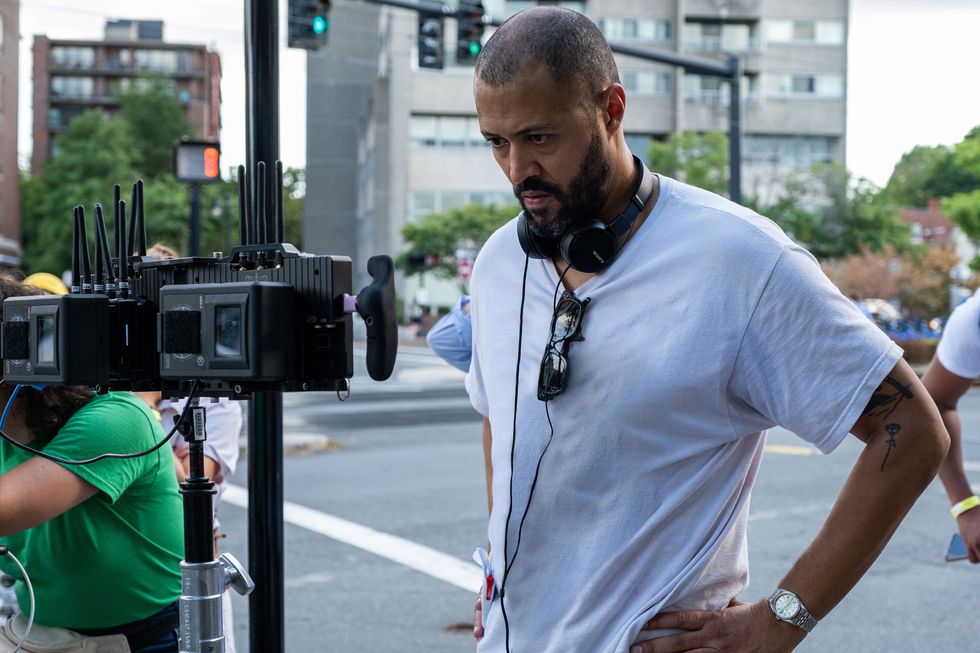American Fiction Shows How Comedy Is a Black American Superpower
This story contains spoilers for American Fiction.
I had to leave the Hollywood red carpet screening of American Fiction to take a quick breather after Tracee Ellis Ross’s character, Lisa Ellison, died of a heart attack within the first 20 minutes of the movie. Clutching my pearls, I thought, “Wait, isn’t this a comedy?” Just a few scenes prior, Lisa was winning an epic roasting session against her brother, Monk (Jeffrey Wright). At one point, Monk, a disgruntled professional writer wrestling to reconcile his Blackness with his career, desperately asks his sister if he has ever written anything that changed anyone’s life. To which Lisa quips back with a cigarette in hand, “Absolutely. My dining-room table was wobbly as hell before your last book came out.” Ouch. Later, over lunch, the two are sparring over how to care for their mother, whose health is deteriorating due to Alzheimer’s. Lisa not only works at an abortion clinic, but she also serves as primary caregiver of their mother and is still moving through the painstaking remnants of her own divorce. As Lisa riffs with her brother about her ex-husband, she’s suddenly gripped by arm pain, as Monk helplessly watches her succumb to a heart attack. Given that Black women have the highest rate of death due to heart disease in America, this scene is no joke. It’s emblematic of the way satire can be used in film to highlight the truth: that the myth of Black superwomanhood can lead to dangerous consequences. But in the midst of tragedy, the triumph of American Fiction is that it gives reverence to the complexities of death, while holding space for the humor that serves as a cultural reflex to grief. How else could Black Americans wade through the waters of generational loss, lies about the value of our lives, and finally, our own limited self-perceptions, without drowning? Laughter is our healer, our North Star.
Erika Alexander, who plays Coraline, Monk’s sharp, soft, “quiet storm” lover, tells ELLE.com that each time she’s watched the film and sees Lisa’s character, she gets a little sadder. “Her reality is that she’s overwhelmed. She’s smoking. She’s not doing things good for herself. She’s trying to take care of her mother. She’s trying to take care of her community, and she dies young. Come on. Like, wow, what about her?” she says. As absurdity goes, even after death, Lisa remains funny. While her family sprinkles her cremated ashes along the Massachusetts coast, they read in her will that she hopes she died under the “heaving thrusts of a sweaty Idris Elba.” While some could view that dialogue choice as quite off-putting for a funeral scene, the inescapable cost of Black life is that laughter and sorrow often dance right beside each other. As Sterling K. Brown’s character Clifford mentions in one scene, it’s “funny in a sad way, like someone dying on a toilet.” That delicate balance of play and pain is what makes comedy art.
“One of the great things about satire for Black cultural expression in particular, is that it allows you to make these jokes and speak truth to power and articulate your perspective, while doing it with a kind of veil of comedy, even if it’s not funny,” Dr. Danielle Fuentes Morgan, an associate professor at Santa Clara University and author of Laughing to Keep from Dying: African American Satire in the Twenty-First Century, tells ELLE.com. Dr. Morgan explains that comedy lives as a sharpened tool in a Black person’s survival kit stemming back generations. “Even during slavery, there are instances of enslaved people making jokes amongst themselves and feigning stupidity, feigning ignorance, and those are all satirical gestures.” Black people even managed to retain power and self-definition in the minstrel era, when Black Americans were pigeonholed into on-screen stereotypes of big-lipped, watermelon-eating jesters in the 1800s. “There’s a level of the minstrel stage, where Black people could kind of cut their eye over to each other and chuckle with this sense of, ‘Can you believe we’re making money doing this and fooling these idiot white folks?’” she says, adding that “laughter can create realms of unexpected power and survival,” which can be healing for a historically traumatized people.
The healing benefits of laughter are backed by science. Laughter is linked to increased pain tolerance, reduced anxiety and stress, decreased inflammation, and even improved cardiovascular function in some cases, according to research. However, the benefits of laughter are offset by the health consequences of masking trauma, a burden Black folks carry as they are forced to assimilate into spaces that don’t make room for their fullness. Studies show that suppression of the true self is linked to higher levels of depression and can impact one’s self-esteem and psychological well-being. Satire serves as a container to authentically share the pains of Black life, without the pushback that normally comes with keeping it real. “It’s supposed to be entertaining,” Dr. Morgan adds, “and that gives us a way to take a little bit of the bite out of the reality of what we’re saying.”
Lanita Jacobs, an anthropology professor at the University of Southern California and author of, To Be Real: Truth and Racial Authenticity in African American Standup Comedy, tells ELLE.com that within satire, “Black anger and despair meets rage but gets expressed in comedic retorts.” In American Fiction, Monk is Black rage meets comedy embodied. He channels his seething resentment towards racism in the publishing industry into a stereotype-laden mockery of his grief, My Pafology, which he later renames, Fuck. To his chagrin, the book ends up being a hit with publishers and positions him for the first time in his career to make a hell of a lot of money. Monk finds himself stumbling at a moral crossroad, torn between staying true to his art or “selling out.” Spoiler alert: He chose to pay his bills. Ironically, he spent the bulk of the movie internally criticizing successful writer Sintara Golden (played by Issa Rae) for doing the same thing—“playing the game,” as Rae described it.
In one scene, Sintara, a college-educated best-selling author, reads an excerpt from her book, We’s Lives in Da Ghetto, to a mostly white audience, shouting in exaggerated African American Vernacular English (AAVE): “Yo, Sharonda! Girl, you be pregnant again?” Followed up with, “If I is, Ray Ray’s goin’ be a real father this time around.” The audience erupts in heartfelt cheers and applause. Jacobs explains that satire, at this level, “may seem on the surface as inappropriate miming if you look at it simplistically,” but at its core, this type of performance “gives ourselves permission to empathize with someone” who is balancing seemingly contrasting sides of one’s identity: being from “the hood,” while also being a “woke,” liberal audiences’ wet dream. For Black folks who live at this intersection, the reality is, there is no contrast at all, just a lack of understanding of our inherent multi-dimensionality. All this underscores the central pain point in Percival Everett’s Erasure, the novel that inspired American Fiction’s Oscar-nominated adapted screenplay by director Cord Jefferson.
Even though Sintara’s character serves as Monk’s arch-nemesis and, from my point of view, the shadow-side of his psyche, her freedom, though agitating to Monk at first, ultimately frees him, too. To Alexander, Monk represents “an internal wish of Black people to be free of narratives that have been keeping us in the cheap seats,” she says, and perhaps taking the reins of our own stories is one way to give more Black people a stool at the table. If anyone deserves to laugh all the way to the bank, it’s the most marginalized among us. Dr. Morgan, who has taught Everett’s Erasure “millions of times” in academia, says she was struck by the very last scene of the film, when Monk makes eye contact with the actor dressed as the enslaved person in Plantation Annihilation on a film studio lot. She says, “For both Monk and that actor, and Sintara Golden as well, they are leaning into the idea that there’s a financial benefit to be gained from feeding mainstream audiences the narratives they want to be fed.” We see this dynamic play out time and time again on the small and silver screen, as well as in real life. Jacobs said that shows like Atlanta and Insecure “greased the wheel” for the kind of warm reception of Black satire we are seeing unfold now in Hollywood. It’s a bold declaration to laugh out loud in the face of generations of cultural invisibility.
What if the happy ending for Black folks is what happens in the heart when it expands to hold both joy and grief at once, without judgment, in a sanctuary of inside-jokes? Bonus points if you can make a few bucks for yourself and your family along the way. Jacobs, when speaking on the influence comedy has had on her own Black life, recalls fond memories of sitting down on the couch with her family watching Eddie Murphy’s scathing 1987 stand-up comedy show, Raw. She remembers one bit that made everyone in the living room burst into laughter at once. “I think for Black people, the capacity to laugh at the same time, to laugh in the face of absolute violence of racism, is a way that we free ourselves,” Jacobs says. Well, we’ve laughed this far to freedom, so far. American Fiction’s Oscar buzz proves that.





